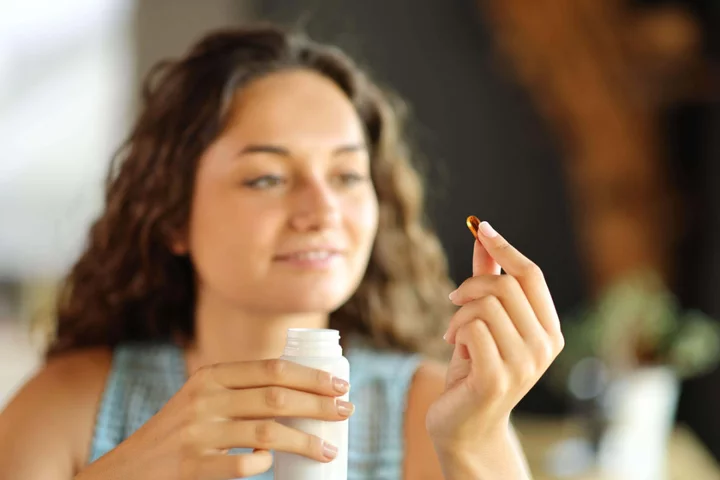
Mindy Kaling and Dev Patel executive produce To Kill a Tiger
Hollywood star Mindy Kaling has been announced as an executive producer of 'To Kill a Tiger'.
2023-08-16 17:57

Miley Cyrus teases new track Used To Be Young
Miley Cyrus is poised to return with a new song called 'Used To Be Young'.
2023-08-16 17:53

Jessica Chastain wants to make A Most Violent Year sequel
Movie star Jessica Chastain is keen to make a sequel to 'A Most Violent Year'.
2023-08-16 17:49

Supergroup Mantra of The Cosmos share latest single
Mantra of The Cosmos performed the track at Glastonbury in June.
2023-08-16 17:49

Tribunal says Georgia teacher who read book on gender identity to her fifth grade class should not be fired
A three-person tribunal has recommended against the firing of a Georgia teacher who is at risk of being terminated after reading a book about gender identity to her fifth grade class, according to the teacher's attorney.
2023-08-16 17:48

First on CNN: Some of America's poorest communities are landing clean energy projects worth billions
Rural Mingo County, West Virginia, is one of America's poorest counties. Nearly one-third of its residents live below the poverty line, only a third of its population is employed and countless lives have been upended by opioid addiction.
2023-08-16 17:48

Vegan diet can reduce hot flashes associated with menopause, study suggests
Plant-based diets with a sufficient amount of soy can reduce hot flashes while also aiding weight loss, according to the Women’s Study for the Alleviation of Vasomotor Symptoms (WAVS) trial. A study published by the North American Menopause Society in the journal Menopause found that a diet intervention is about as effective as hormone replacement therapy for reducing menopausal hot flashes, without the associated health risks. “We do not fully understand yet why this combination works but it seems that these three elements are key—avoiding animal products, reducing fat, and adding a serving of soybeans,” explained lead researcher Neal Barnard, MD, president of the Physicians Committee and adjunct professor at the George Washington University School of Medicine. “Our results mirror the diets of places in the world, like pre-Westernized Japan and modern-day Yucatán Peninsula, where a low-fat, plant-based diet including soybeans is more prevalent and where postmenopausal women experience fewer symptoms.” To conduct the study, researchers recruited 84 postmenopausal women that reported episodes of hot flashes two or more times per day. Participants were randomly assigned into two groups. One group was an intervention group that was on a low-fat vegan diet consuming half a cup of cooked soybeans daily, while the other was a control group with no dietary changes for 12 weeks. After 12 weeks, researchers found that those on a vegan diet had a 88 per cent decrease in moderate to severe hot flashes and had lost an average of eight pounds. This is about the same success rate as hormone replacement therapy (HRT), which is usually 70 to 90 per cent effective against hot flashes. The trial was split into two parts, the first being published in 2021 and the second being published this year. It successfully addressed the point that there may be positive changes seen in menopause relief due to seasonal temperature variations. The first trial, which was conducted during the autumn season raised the question of whether this symptomatic improvement might have been attributed to cooler temperatures. But women who began the study as the weather warmed up in the spring had the same benefit, ruling out the effect of the temperature outside. “These new results suggest that a diet change should be considered as a first-line treatment for troublesome vasomotor symptoms, including night sweats and hot flashes,” explains Dr Barnard. Dr Barnard and the team agree said their results not only support putting diet and lifestyle at the forefront of the conversation with hot flash relief during menopause but also for other common complications such as weight gain and chronic disease implications. “This study demonstrates the effectiveness of a dietary intervention for menopausal symptoms,” Dr Barnard said. “As well, it is precisely the diet that would be expected to reduce the health concerns of many women reaching menopause: an increasing risk of heart disease, breast cancer, and memory problems.” The findings are published in the journal Menopause. Read More What are the symptoms of menopause and how can they be relieved? What’s the link between the menopause and anxiety? Menopause affecting your mental health? Experts reveal what to do What I gained (and lost) by walking 10,000 steps each day for 5 months Raven-Symoné details cosmetic surgeries she had before she turned 18 Nearly half of US adults are interested in taking weight loss prescription drugs
2023-08-16 17:22

Vitamin D intake ‘may reduce cancer mortality in the population by 15%’ – study
Taking regular Vitamin D supplements may reduce cancer deaths in the population by 15%, according to scientists. Data gathered from the UK Biobank, an online database of medical and lifestyle records of around 500,000 Britons, indicates vitamin D deficiency is linked to an increased cancer mortality risk – particularly in relation to bowel, stomach, prostate, and lung cancers. The researchers said their work, published in Elsevier’s European Journal of Cancer, adds to evidence that vitamin D may have a protective effect against cancer. While the findings do not explain why this happens, the team said one possibility is that vitamin D supplements may induce anti-inflammatory, antioxidant, and DNA damage repair mechanisms, which can thwart mutations that allows tumours to grow. Study author Ben Schottker, an epidemiologist at the German Cancer Research Centre, said: “Our findings identified a statistically significant relationship between vitamin D deficiency and increased mortality among several cancers. “These results can be explained by other studies, which found mechanisms by which vitamin D inhibits cancer growth and metastasis.” The NHS advice is that adults and children over four take a daily supplement containing 10 micrograms of vitamin D throughout the year. According to the Department of Health and Social Care, around one in six adults and almost 20% of children in the UK have vitamin D levels lower than government recommendations. Older people, the housebound and people from black and South Asian communities are more likely to have lower levels of vitamin D. Our findings identified a statistically significant relationship between vitamin D deficiency and increased mortality among several cancers Ben Schottker For the study, the researchers looked at data from more than 400,000 people aged 40–69. In-depth medical information was gathered through blood, urine and saliva samples. A short interview and a questionnaire as used to assess vitamin D consumption as well as lifestyle factors such as alcohol consumption, smoking. Follow-up data on health outcomes were gathered through NHS links as well as care data, cancer screening data, and disease-specific registers. Over a period of nearly 13 years, close to 13,000 people died of cancer. Results showed a majority of the study population had either vitamin D deficiency (21.1%) or insufficiency (34.4%) – used to describe low levels of vitamin D. Of the people involved in the study, only 4.1% regularly took a vitamin D supplement and 20.3% regularly took a multivitamin. Results showed that vitamin D supplement users had 15% lower total cancer mortality and 25% lower lung cancer mortality compared to those who did not take the supplement. The also found researchers found that those with vitamin D deficiency had 42% increased mortality for stomach, 27% for bowel, 24% for lung, and 36% for prostate cancers. Meanwhile those with vitamin D insufficiency were found to have 14% increased bowel cancer mortality and 19% increased lung cancer mortality. The scientists said that the potential to reduce cancer mortality by vitamin D supplementation in populations with low levels should be further explored in new research. Commenting on the study, Dr Jenna Macciochi, senior lecturer in immunology at the University of Sussex, said: “This study adds to the growing body of evidence on vitamin D and cancer. “Vitamin D plays multiple key roles in immune health and the immune system is part of the body’s cancer defence system. “With cancer rates rising and presenting a serious public health issue, its useful to have further insight into the role of vitamin D in the prevention of cancer.” But Dr Macciochi also cautioned that the Biobank data might not be diverse and representative of the whole of the UK population. Alex Ruani, doctoral researcher at University College London and chief science educator at The Health Sciences Academy – who was not involved in the study, said that the exact dosage taken by participants was not ascertained and the risk reduction was not the same for all cancers. She said: “This research doesn’t imply that taking vitamin D3 supplements will for sure lower your risk of death from cancer. “Supplementation may help with consistent vitamin D levels, whereas production from sunlight can be variable and dependent on weather, time of the day, exposure duration, being outdoors or indoors, protective UV wear or sunblock, and many other factors.” She added: “Common food sources of vitamin D3 include full-fat dairy, egg yolks, and fish. “Although toxicity is rare, there is an upper tolerable limit set in the UK, where vitamin D3 supplementation shouldn’t exceed 100 micrograms a day.”
2023-08-16 17:15

Men who cycle, jog or swim could cut risk of nine cancers – study
Male joggers, swimmers and cyclists could be cutting their risk of nine cancers, a new study suggests. Researchers found that men with good cardiorespiratory fitness are far less likely to go on to develop cancers of the head and neck, stomach, pancreas, liver, bowel, rectum, kidney, lung and oesophagus. Cardiorespiratory fitness refers to a person’s ability to do aerobic exercise, such as running, cycling and swimming for sustained periods, or even to climb stairs. The new study, published in the British Journal of Sports Medicine, saw experts from Sweden track just over a million men for an average of 33 years. The men involved in the study were conscripted to military service in Sweden between 1968 and 2005. At the start of their conscription the men underwent a battery of tests assessing a number of factors including their height, weight, blood pressure, muscle strength and cardiorespiratory fitness. During the follow-up period, about 84,000 developed cancer. Researchers found that, compared with those with low cardiorespiratory fitness, men with a higher level of cardiorespiratory fitness were: – 19% less likely to develop head and neck cancer.– 39% less likely to develop cancer of the oesophagus (food pipe).– 21% less likely to develop stomach cancer.– 40% less likely to have liver cancer.– 18% less likely to develop bowel cancer and 5% less likely to develop cancer of the rectum– 20% less likely to develop kidney cancer.– 42% less likely to develop lung cancer.– 12% less likely to develop pancreatic cancer. “These results could be used in public health policymaking, further strengthening the incentive for promoting interventions aimed at increasing [cardiorespiratory fitness] in youth,” the authors wrote. The researchers did find that higher cardiorespiratory fitness was linked to a slight (7%) increased risk of prostate cancer and a 31% increased risk of skin cancer. A previous study examining the same data set suggested the slight increase in risk for prostate cancer was not linked to a higher rate of aggressive prostate cancer or prostate cancer death, and could be attributable to increased screening. The authors suggested a higher skin cancer rate could be explained due to “higher UV exposure”. Read More Charity boss speaks out over ‘traumatic’ encounter with royal aide Ukraine war’s heaviest fight rages in east - follow live Why are wellbeing experts concerned about TikTok’s ‘lazy girl job’ trend? Red flags you might be missing about your child’s online safety Rumer Willis says she is ‘grateful’ to her body following birth of daughter
2023-08-16 16:52

Why are wellbeing experts concerned about TikTok’s ‘lazy girl job’ trend?
Have you clocked TikTok’s ‘lazy girl job’ trend? It’s all about prioritising work-life balance over a job that drains you dry. A ‘lazy girl job’ is one that pays well enough for you to live comfortably – but doesn’t need to define your entire self-worth and consume too much of your time and energy. On the surface, this all sounds quite healthy, a backlash to the always-on ‘hustle culture’ that’s become ingrained in the modern world. So, why are wellbeing experts concerned? Work-life balance isn’t lazy “Turning your back on hustle culture shouldn’t be deemed ‘lazy’,” Tina Woods, CEO of Business for Health, a business-led coalition focused on improving workforce health, told PA Media. “A healthy work-life balance should be encouraged, rather than shamed, and employees shouldn’t feel guilty or ashamed for prioritising their wellbeing and mental health over their work duties and workload.” So, it’s not so much the concept behind ‘lazy girl jobs’ that’s problematic. Rather, it’s the use of the word ‘lazy’ to describe somebody who works a reasonable number of hours and values their wellbeing, and the reasons we got to this point in the first place. Have we normalised overworking? There may be times when people need or choose to hustle, or devote a larger chunk of their time towards a particular goal. That’s not something we need to sweepingly demonise necessarily. “Just as we shouldn’t shame employees who do set boundaries in the workplace and [want] a healthy work-life balance, there will be some employees who enjoy ‘hustle culture’,” Woods added. “Ultimately, employees should have the choice and flexibility to work how they choose to.” What isn’t good though is how “overworking” has become “expected” as part of modern working culture, she explained. We’re seeing a growing culture of overworking being celebrated... Tina Woods, Business for Health CEO “Hustle culture has grown in popularity since the pandemic, with side hustles on the rise amongst employees, especially Gen Z. However, the notion of pushing yourself and putting your all into your work can cause both physical and mental effects. It can lead to a toxic working pattern and trigger stress and burnout, as well as physical ailments such as disrupted sleep patterns and exhaustion,” said Woods. “More often, we’re seeing a growing culture of overworking being celebrated and, in many situations, expected. Whether this presents itself through staying at the office late, or not taking a lunch break or annual leave, working tirelessly is being rewarded by some seniors, and it shouldn’t become the norm.” What does this mean for young women? The fact the trend has been centred on ‘girls’ is another point of consideration. “Traditionally, women and especially mothers have faced stigma in the workplace. This includes stigma around personality traits, maternity leave and women’s health. As a result, many female employees will feel the need to push themselves harder or work longer hours than their male peers,” said Woods. “Women and parents are more likely to report lower mental health, putting them more at risk for mental health conditions such as anxiety and depression. This, coupled with the pressure women may already feel at work and stigma, such as the latest ‘lazy girl job’ trend, means employers need to ensure they’re creating a supportive work culture and healthy environment.” Culture shift According to Woods, there is a responsibility for employers to drive cultural shifts towards a healthier approach to work with a focus on preventative measures, rather than waiting until employees are encountering problems such as burnout or chronic stress, and then responding. “Setting boundaries that lead to a healthy work-life balance is something that should be encouraged in the workplace. It’s clear that post-pandemic, the boundaries have become blurred, with many adapting to hybrid and remote working. However, this is an issue employers need to make a priority,” said Woods. “By doing so, workplaces will see higher levels of presenteeism, alongside boosted morale, engagement and productivity. In a tight labour market, attracting and retaining employees is also vital. Wellbeing plays a big role in that. “Policies such as ‘Permission to Pause’ can be really powerful in encouraging a healthy work-life balance. They give employees autonomy and the ability to stop and take some time for their wellbeing within the working day, without feeling guilty,” she added. “Perhaps, most importantly of all, employers need to listen and respond to the needs of their own workforce and sector, recognising there is no ‘one size fits all’ solution to health and wellbeing, because everyone is uniquely human. Business leaders, HR managers and line managers can work to better understand the needs of their workforce through pulse surveys, interviews, and open forums.” Read More Charity boss speaks out over ‘traumatic’ encounter with royal aide Ukraine war’s heaviest fight rages in east - follow live Red flags you might be missing about your child’s online safety Rumer Willis says she is ‘grateful’ to her body following birth of daughter Sugary cereals and yoghurts must remove child-friendly packaging – health group
2023-08-16 16:26

'Ouch!': Nick Jonas falls into hole on stage at Jonas Brothers' Boston gig
Nick Jonas took a tumble at the latest Jonas Brother concert but quickly recovered to continue the performance.
2023-08-16 15:25

Madonna unveils rescheduled Celebration Tour dates
Madonna has had to cancel five North American tour dates and changed some venues.
2023-08-16 15:24
